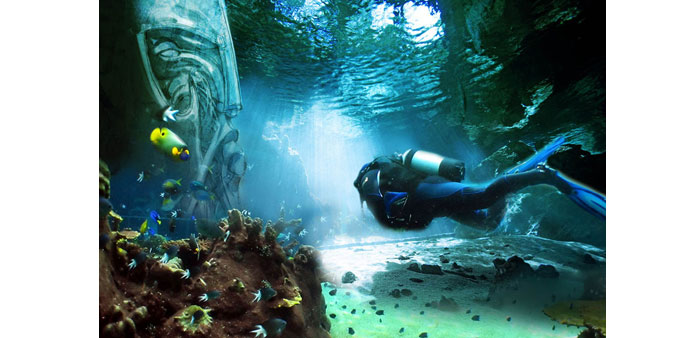The next-generation artificial reef sites, being designed by Los Angeles-based Reef Worlds to look like ancient “lost cities”, are slated to open early next year
|
|
A US-based reef developer is in talks with local partners to create a series of “unique and spectacular” underwater theme parks for waterfront resorts in Qatar, it is learnt.
The next-generation artificial reef sites, being designed by Los Angeles-based Reef Worlds to look like ancient “lost cities”, are slated to open early next year. The project proposes to rebuild regional reef habitat and allow select waterfront resort development partners capture a slice of the global $3bn dive and snorkel market.
Reef Worlds development teams are in discussion with two resort developers to bring these sites to the region. To a query, a company spokesman said: “We are at the MoU (memorandum of understanding) stage and have not signed contracts - yet.”
Dave Taylor, director of development for Reef Worlds, said: “Qatar has a unique tourism problem that we address. When one considers the 350 miles of coastlines surrounding Qatar, scuba diving and underwater exploration is not on the Top Ten list, and yet it is almost everywhere else in the world. We want Qatar to be on the global tourism stage.”
According to him, the revised plan is to develop Dynamic Reef sites for Qatar. “The difference between an artificial reef and a Dynamic Reef is the tourism and media aspect.”
The project has its focus on environment protection. “The Gulf region is in trouble with 40-50% coral and reef loss. We see Dynamic Reefs as a smart and sustainable way to bring back regional habitat.”
The company has plans to expand with waterfront resort developers from Qatar to the South East Asia in places where tourism and regional habitat could get an immediate boost with the addition of bespoke next generation artificial reefs.
“The Reef Worlds brand is all about sustainability and the creation of new habitat while at the same time adding instant tourism revenue and excitement to waterfront resorts,” said Taylor. “With the help of Reef Worlds design teams, resorts are rediscovering acres of property, client engagement and new sources of revenue.”
Taylor said that at present Qatar did not have a very large footprint in the dive and snorkel tourism space though it did have miles and miles of great coastlines. “With a little vision, Qatar Tourism could put in place a series of sites that would dominate the global conversation about new habitat creation and become the number one Gulf state for dive and snorkel tourism.”
In the region, Bahrain and Oman have together spent $40-60mn on artificial reefs. “The Muscat project was 2km long and cost about $20mn. We could do the same thing in a series of smaller sites outside every waterfront resort development in the region, boosting tourism and habitat in a very substantial way,” Taylor said.

